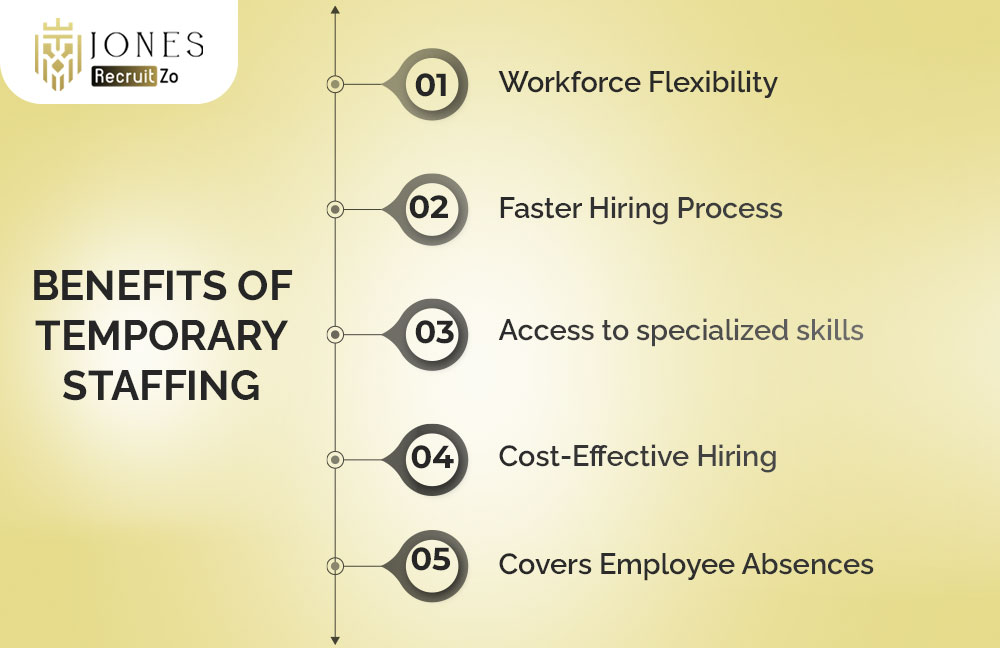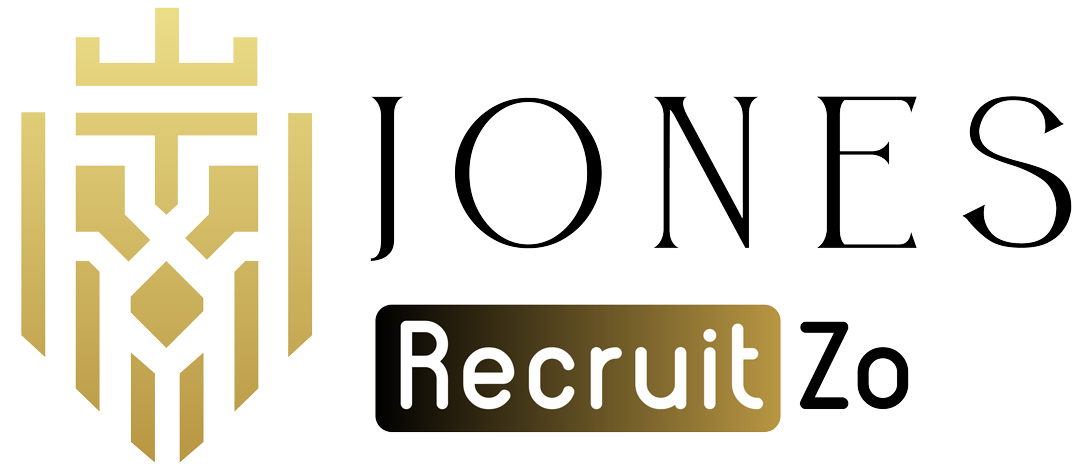What Is Temporary Staffing?
Temporary staffing is hiring workers for periods usually less than 12 months in contract-based, projects-based work or assignments. Unlike permanent employees, temporary staff members are hired for a specific limited time and mostly through staffing agencies to meet business needs without long-term commitments.
This arrangement exists across different industry organisations. Seasonal demands, project peaks, or absence of trained workers will be the most common and inevitable reasons for firms to consider temporary staffing needs. Scaling in or out temporarily at the most productive and cost-effective times through flexible hiring is a solution for many firms because of any of these reasons.
Benefits of Temporary Staffing

Temporary staffing provides businesses with the flexibility to adapt to changing workforce demands while keeping costs under control. Here are some of the key employee benefits that make temporary staffing a valuable solution for companies.
-
Workforce Flexibility
Temporary staffing allows companies to alter their workforce based on demand at a given moment. When work increases due to a season or a particular project in sudden need, businesses can quickly add or reduce personnel without long-term commitments of permanent hiring.
-
Faster Hiring Process
The long and tiresome process of recruiting generations can be shortened into weeks by staffing. Because of already pre-vetted applicants in the pool of staffing agencies, a business could fill up its positions without spending weeks in recruitment.
-
Access to specialised skills
On some occasions, companies may require highly skilled professionals for a short period to work on a specific project. Temporary staffing allows businesses to bring in niche expertise specialists without incurring the full-time cost of hiring them.
-
Cost-Effective Hiring
Hiring full-time employees comes with additional expenses like benefits, training, and severance pay. Temporary workers, on the other hand, reduce payroll costs while still ensuring the work gets done efficiently.
-
Covers Employee Absences
Maternity and sick leaves are well covered in the range of temporary staffing. That means an immediate replacement for the worker who will be absent, thus helping any organisation keep its day-to-day affairs running smoothly without loading existing employees with even more work.
What is the difference between permanent and temporary staff?
The key difference between permanent and temporary staff lies in job duration and employment benefits. Permanent employees work under an indefinite contract with a fixed monthly salary, perks, and career growth. Temporary employees, on the other hand, are recruits hired for a specific term of employment or specific project. They may not be entitled to the same benefits that are offered to permanent employees, nor are they entitled to long-term job security.
Temporary staff are often hired through a staffing agency, while permanent employees are direct hires of the company. The combination of the two employment categories gives businesses stability and flexibility to ensure that workforce needs are met in an efficient way.
How Temporary Staffing Works?
Understanding how temporary staffing functions is crucial for businesses looking to optimise their hiring strategy. Here’s a step-by-step breakdown of how temporary staffing works, from partnering with agencies to managing temporary employees effectively.
-
Partner with
Most companies work with such consultancies when it comes to hiring for temporary jobs. Consultancies are usually in charge of the recruitment process so that the businesses may be able to receive qualified candidates who can take up jobs quickly.
-
Defining Workforce Needs
Companies should find and clearly define their staffing requirements before hiring. Their need specification should include job roles, skill sets, employment duration, etc. The clearer one is on these specifics, the better the chances are that candidates will fit into the appropriate place with minimal hassle in hiring.
-
Onboarding Temporary Employees
Temporary workers may stay with the company for only a short time, but they do need to be properly onboarded. This includes equipping the employee with tools, training, and an understanding of workplace expectations that will enable them to contribute from day .
-
Management of the Employees
While temporary workers may not be permanent team members, effective management is essential for productivity. Regular check-ins, clear communication, and performance monitoring help ensure they integrate well into the workplace and contribute effectively.
Why is Temporary Staffing Important for Businesses?

Temporary staffing plays a vital role in helping businesses stay competitive and responsive to market demands. Here’s why companies rely on temporary staffing to address workforce challenges and maintain operational efficiency.
-
Meeting Seasonal Demands
Various industries, such as retail, hospitality, and agriculture, all experience seasonal changes. Temporary staffing enables companies to handle peak workloads in an efficient manner without having to hire on a permanent basis.
-
Managing Workforce Fluctuations
In industries where workloads can be unpredictable, temporary staffing is a boon for a business to ramp up or down its personnel needs, thereby avoiding over staffing in lean periods and understaffing in busy times.
-
Filling Skill Gaps
Temp workers often bring in specific skills and expertise that businesses may not have internally. Hiring temporary specialists means that the job gets done with a guarantee of quality but without any long-term commitment on the side of the employer.
FAQs
1) What is temporary staffing?
Temporary staffing refers to hiring employees for a short span of time, usually through staffing agencies, to satisfy an immediate business need. These employees would work for a few days or weeks, depending on the nature of the work given to them, or until the project has been completed.
2) How does temporary staffing work?
Temporary staffing agencies work with staffing organisations that interview and pre-screen employees for businesses. Companies will specify their own forecast of workforce needs, onboard selected candidates, and further manage those employees for the allotted time.
3) What are the benefits of temporary employment?
Temporary employment enhances workforce flexibility and allows hiring for specialised skills at short notice and a much-reduced cost. Lastly, temporary employment is a means of filling in for absent employees.
4) What is the difference between permanent and temporary staff?
Permanent staff are hired for a long-term tenure with some job security and benefits, while temporary workers are employed for a certain period without long-term commitments.














